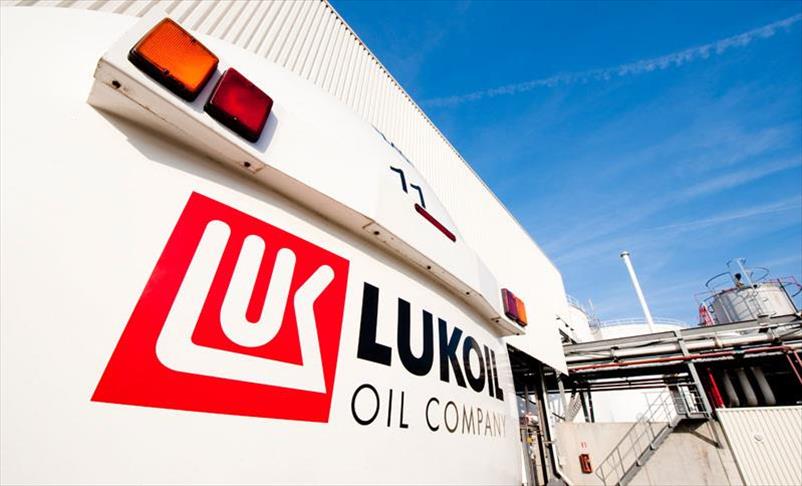Russian oil giant LUKOIL is preparing its next 10-year budget based on oil prices at $50 per barrel, Managing Director of LUKOIL Western Europe, Bulat Subaev told Anadolu Agency,
Subaev, in the interview from the Benelux office center in Brussels, said of the three scenarios that the company took into consideration for budgeting, oil prices based on $100 was ruled out.
He deliberated on oil prices and referred to LUKOIL's ability to overcome the surprising fall in oil prices that occurred a few years ago in which many companies incurred very big losses.
He hailed LUKOIL for its management of the crisis, thanks in part to the diversity of the company's business, adding that good and stable results came from the downstream sector.
He argued that stability in the market is essential, and opted to avoid excessively high prices.
'Excessively high prices do not have a good impact on the business. It would not be beneficial if the price goes beyond $100 and remains highly volatile. Instead, we must stabilize the market and make it predictable. We are not even considering a $100 scenario in the next 10 years,' he underlined.
Rather a low-cost scenario is preferable, he said, adding 'We are in these parameters for now, while adjustments of these parameters are possible.'
- 'Liquid fuels will still be needed'
Subaev also referred to the changed focus in the oil market to using other alternative fuels but said that liquid fuels would be used as a transition in the move to cleaner fuel use.
He cited the recent announcements from the Netherlands, France and the U.K. on potential bans on new cars with internal combustion engines, but declared this is unlikely to happen before 2030.
'It will take time for these vehicles powered by electricity or hydrogen to penetrate the market, and therefore liquid fuels will be needed for this energy transition,' he said.
The International Energy Agency estimates that liquid fuels will represent 70 percent of the energy used in transport in 2035.
Subaev said that LUKOIL is aware of the political will particularly in EU countries for a wider use of alternative fuels and for electric vehicles.
The European Commission in supporting the electrification of transport, and the EU is likely to set up an objective to decrease emissions from road transport by at least 35 percent in 2030 compared to 2021.
As a result, he said LUKOIL is providing alternative fuels like CNG (compressed natural gas) at some stations and plans to offer fleet cardholders a network of electric chargers.
'This means that approximately one-third of new cars sold between 2020 and 2030 will be alternatively powered, electric or hybrid in most cases. We know about this trend. But nonetheless, liquid fuels will be part of the mix, even beyond that date,' Subaev surmised.
'Although the demand for road transportation fuels in Europe will slightly fall in Europe in the coming decade because of a combination of engines' efficiency, emission standards, alternative fuels and electrification, the demand for petrochemicals, aviation and marine fuels is expected to grow, he explained.
Thus, he stressed the core focus of the company's strategy is on efficiency instead of quantitative growth.
- Impact of diesel scandal
He attributed the diesel scandal in which Volkswagen was found to have manipulated exhaust emissions in diesel cars, as a catalyst for change in legislation, improving diesel quality and for a shift in its use.
The scandal had an impact on diesel sales in Belgium and this was also reflected in Belgian legislation.
'The excise duty on diesel has been lower compared to gasoline for a number of years, but recently the authorities have rebalanced the excise duties in order to reach an equal price for both fuels, and this has impacted consumers’ choices,' Subaev highlighted.
He said it is important to stress the quality of diesel cars is also improving with the introduction of the new standards, which have resulted in a decrease in emissions, and have minimized the impact on diesel on air quality.
'Stricter limits will be gradually applied to new [diesel] models starting from 2019. We believe that diesel will play an important role in the future, especially in the heavy-duty and maritime sectors as it is a more efficient fuel, and for this reason, a better option for those types of transport,' he forecasted.
- 'Turkish stations among best in Europe'
Subaev, also commenting on the fuel stations in Turkey and Belgian, said the main difference between them is their business models.
'In Belgium, we operate stations under the CODO – company owned, dealer operated system. In Turkey 95 percent of stations are operated under the DODO system - the same dealer owns and operates the station,' he explained.
Fuel companies in Turkey work towards providing new services and products at the stations to be able to compete, he said.
'Gas stations in Turkey are among the best in Europe in terms of services, but the stations in Benelux are among the best in terms of efficiency, automation and fuel quality. The stations in Turkey are large and attractive. The local market pays much attention to customer satisfaction,” he said.
For Turkish customers, location and product quality are the most important factors when choosing a gas station, he affirmed.
The situation in Belgium is different and the main factor for loyalty is the price, he said.
In Benelux, fully automated terminals and gas stations with a minimum of employees is the norm.
'In Europe, fuel quality standards are very high due to strict regulations, so customers do not choose the station based on fuel quality,” he explained.
In total, LUKOIL operates more than 260 fuel stations in the Benelux, as well as two fuel terminals, and a refinery in a joint venture with TOTAL.
By Nuran Erkul Kaya
Anadolu Agency
energy@aa.com.tr


